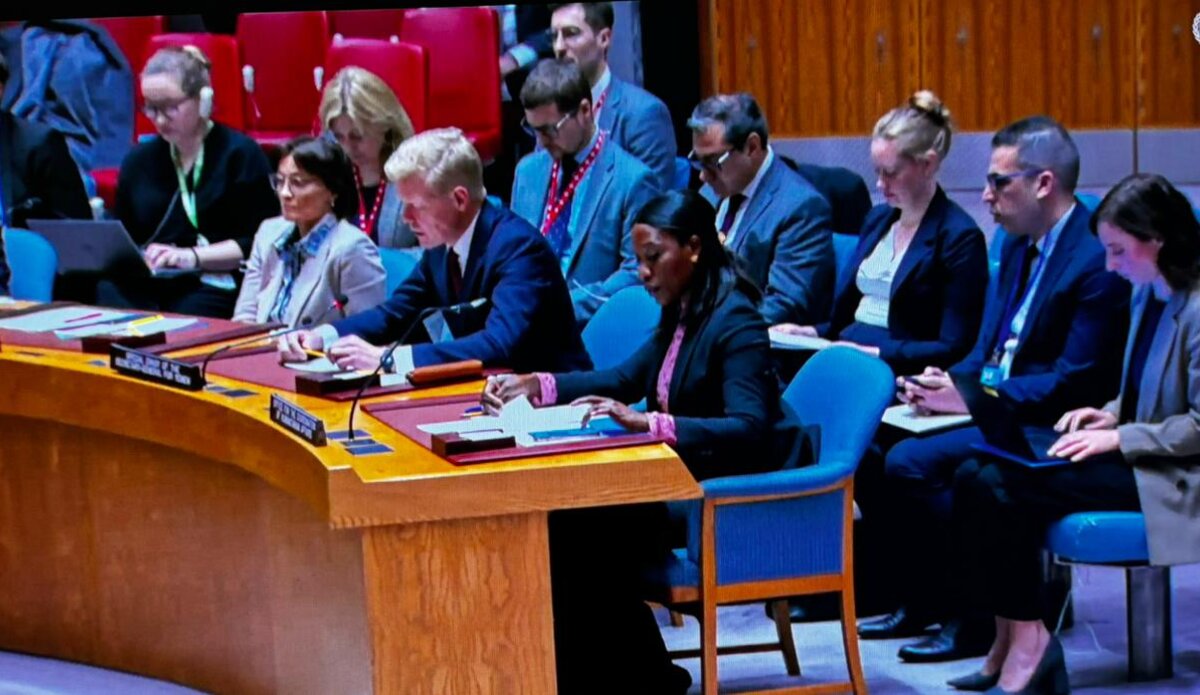Briefing by the UN Special Envoy for Yemen, Hans Grundberg, to the Security Council
Thank you, Mr. President.
Mr. President, allow me to start by wishing Yemenis, as well as Muslims around the world, a blessed Ramadan. May this holy month bring Yemenis, and people across the world, reasons to hope for a more peaceful future. Ramadan Kareem.
Mr. President, we had hoped – and Yemenis had expected – that, by this Ramadan, we would have had an agreement on a nationwide ceasefire and measures to improve living conditions in Yemen. I had hoped I would be briefing you about the preparations for an inclusive political process. Public sector employees across the country should have been receiving their salaries and pensions. Oil exports should have resumed, which could have enabled more effective service delivery and improved economic conditions. And we should have had another agreement on the release of prisoners, allowing loved ones to return home in time for Ramadan. While these hopes and expectations have not, to date, been met, our efforts in finalising and implementing a United Nations roadmap remain undeterred. I believe that Yemenis share my impatience in achieving these aspirations.
However, as I briefed last month, the mediation space has grown more complex. This continues to be the case. Although we have tried to shield the peace process from regional developments since the war in Gaza, the reality is, and allow me to repeat myself, that what happens regionally impacts Yemen—and what happens in Yemen can impact the region.
Since November of last year, Ansar Allah has been targeting vessels in the Red Sea and the Gulf of Aden. And, in response, since January, the United States and United Kingdom have struck military targets in Ansar Allah-controlled areas. Last week, Ansar Allah attacked a bulk carrier in the Gulf of Aden, killing and wounding several crew members. Another vessel that Ansar Allah recently struck, the Rubymar, left an oil slick and has now sunk in the Red Sea along with her cargo. Regrettably, the current trajectory gives cause for serious concern.
The longer the escalatory environment continues, the more challenging Yemen’s mediation space will become. With more interests at play, the parties to the conflict in Yemen are more likely to shift calculations and alter their negotiation agendas. In a worst-case scenario, the parties could decide to engage in risky military adventurism that propels Yemen back into a new cycle of war. Therefore, allow me to emphasize the importance of remaining focused on the long-term aims that we are seeking to achieve in Yemen.
In order to protect progress on the peace process, I urge all those involved to exercise maximum restraint and work toward de-escalation. With the Red Sea now part of a wider set of concentric circles of escalation, I also reiterate the Secretary-General’s warning about the risk of further spillover of the Gaza conflict across the region, and his recent calls for an immediate humanitarian ceasefire in Gaza.
Inside Yemen, although hostilities have remained at relatively low levels compared to pre-2022 truce period, we have seen continued clashes and troop movements in Hudaydah, Lahj, Ma’rib, Sa’adah, Shabwa and Ta’iz. The parties also continue to make public threats to return to war. Many Yemenis I have spoken to have expressed their fears of a potential escalation in internal fighting. We must do all we can to prevent this. And my Office continues to engage the parties on the need to maintain calm at the frontlines.
Amid the regional turmoil, Mr. President, my work continues to be guided by the priorities articulated by Yemenis for Yemen. And my focus remains on reaching a ceasefire and starting a political process. This is the only way to resolve the conflict in Yemen. Over the past few months, my Office and I have consulted with Yemenis from all walks of life. And they have talked about what they have lost, what peace means to them, and how they think we should get there. One thing we have heard consistently across the board is that their needs and priorities have not changed since this recent regional escalation—they have only grown more urgent.
Therefore, my mediation efforts focus on engaging the parties to bridge gaps and identify ways to initiate a ceasefire, improve living conditions and start a political process, building off the commitments they made in December. As part of this effort, my Office has convened meetings in recent weeks with key security officials in Aden and Ta’iz to prepare for a future nationwide ceasefire. It is imperative that all parties keep channels of communication open and do not lose focus on delivering results for Yemenis.
Mr. President, International Women’s Day this month was a reminder of the disproportionate impact of conflict on women in Yemen, and of the importance of enabling their meaningful participation in the peace process. The conflict has exacerbated gender inequalities, restricting women's access to education, healthcare, and freedom of movement. Imposed guardianship requirements further curtail women's agency and participation in peace efforts.
My Office is continuing its partnership with UN Women to hold consultations with civil society, women political leaders, human rights activists, and representatives of marginalised groups. Through these consultations, we aim to prioritise the voices and experiences of local communities, particularly Yemeni women. Last month, my Office also held a three-day consultative meeting with 30 civil society men and women activists from diverse governorates, discussing their priorities and visions for the peace process, and ideas on how to make UN negotiation more inclusive.
We are also closely following and encouraging local mediation efforts. In recent weeks, thanks to the relentless advocacy and work of Yemeni civil society and local mediators, we have seen renewed attention on the need to open roads that were closed during the conflict. The opening of the Haifan road in Taiz governorate is a step in the right direction. I am encouraged that the parties are giving renewed attention to the issue of roads. However, more needs to be done to prevent incidents and improve coordination between the parties. I urge them to prioritise the collective interest of Yemenis over narrow gains, and to seize this opportunity to meet Yemenis’ expectations regarding the sustainable opening of main roads across Yemen. Supporting the freedom of movement of people and goods across Yemen remains a priority for my Office, and we stand ready to assist the parties as needed. I hope that by the time we meet again next month, there is more positive news to share in this regard.
Mr. President, I have continued working with regional actors, including the Kingdom of Saudi Arabia and the Sultanate of Oman, who play a crucial role in supporting my mediation efforts. Yemen has also been fortunate to have long benefited from the unity of the UN Security Council in supporting a political process under UN auspices. I am grateful that all international stakeholders I have engaged with continue to assure me of their steadfast support to my efforts and to the resolution of the conflict. I will need this concerted backing to ensure strong and consistent signalling to the parties on the need to engage with the peace process. And I will rely on your collective diplomatic action to help me steer the mediation process through the current regional turmoil.
Thank you very much, Mr. President.
 UN
UN







